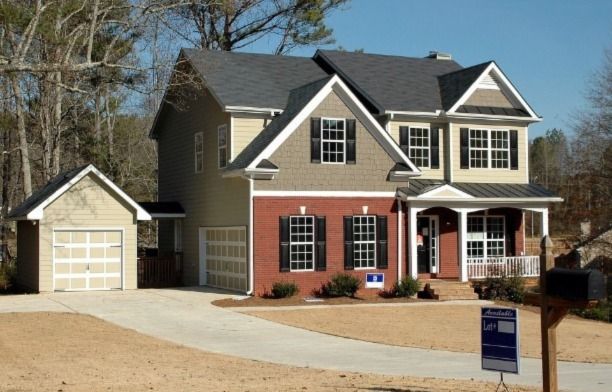Residential real estate refers to properties that are primarily designed for people to live in, such as single-family homes, townhouses, condominiums and apartment buildings.

If you're thinking about dipping your toes into real estate investing, there are many investment property options that you can explore. Some popular ones include commercial real estate, retail properties, REITs (Real Estate Investment Trusts), residential real estate and mixed-use properties.
Like many real estate investors, you may not be absolutely sure of where to begin. A good place to start as a beginner would be in residential real estate because of factors like consistent demand for rental properties in the residential real estate market, low barrier to entry and also access to financing, as many lenders offer mortgages for residential real estate with relatively low down payments and favorable interest rates.
Before you dive in, it is important that you understand a few basic principles that will ensure your success as a residential real estate investor.
Key Points
- Residential real estate refers to properties that are primarily designed for people to live in, such as single-family homes, townhouses, condominiums and apartment buildings among others
- Some things to consider when investing in residential real estate include location, property condition, financing and potential for appreciation
- Pros of investing in residential real estate include steady cash flow and appreciation of underlying property
- Cons of investing in residential real estate include liquidity and regulatory risks
- Proper research and hiring a team of experienced professionals will help you make informed real estate investment decisions
Disclaimer
The contents of this article are for educational purposes only. They are not intended to be a source of professional financial advice. You will find experts on financial planning, financial management, and real estate here. More on disclaimers here.
What is Residential Real Estate?

Residential real estate refers to properties that are used primarily for living purposes, such as houses, apartments, condominiums, townhouses and other types of homes. These properties are intended for personal use by individuals or families as a place to reside, and can be owned or rented.
Typically residential property is purchased for personal use or as an investment. Homeowners may purchase residential real estate as a primary residence or a vacation home, while investors may purchase residential real estate to generate rental income or to flip properties for a profit.
The value of residential real estate can be influenced by a range of factors, including location, market trends and economic conditions. Real estate professionals, such as real estate agents and appraisers, play an important role in helping buyers and sellers navigate the complex process of buying and selling residential real estate.
Types of Residential Real Estate

Residential real estate can generally be classified into these different types:
Single-Family Homes
These are standalone houses designed for a single family to live in. They can range from small cottages to large mansions.
Multi-Family Homes
Multi-family homes are properties that have multiple housing units within a single building, such as duplexes, triplexes and apartment buildings.
Condominiums
Also known as condos, these are individually owned units within a larger building or complex, with shared ownership of common areas such as hallways, parking lots and amenities like a pool or gym.
Townhouses
These are typically multi-level, attached homes that share walls with other townhouses. They are similar to single-family homes but are typically smaller and more affordable.
Co-ops
These are properties where residents own shares in a cooperative corporation that owns the building. Each shareholder has the right to occupy a unit within the building.
Manufactured Homes
These are homes that are built off-site and transported to a lot, where they are assembled and permanently affixed to a foundation.
Vacation Homes
These are properties that are primarily used as second homes or for vacation purposes, such as beach houses, cabins or ski chalets.
Things to Consider When Investing in Residential Real Estate

There are several important criteria to consider when investing in residential real estate:
Location
Location is one of the most important factors to consider when investing in residential real estate. Look for properties in areas with strong job markets, good schools and amenities like parks, restaurants and shopping centers as they tend to make the property more desirable and you can even charge higher rent.
Property Condition
It's important to thoroughly inspect a property before making an investment to ensure that it is in good condition. Carefully consider the age and current condition of the property and also any repairs and renovations that you may need to do.
Potential for Appreciation
Consider the potential for the property to appreciate in value over time. Look for properties in areas with a history of steady price appreciation and consider factors that may affect the property's value in the future, such as new developments or changes in the local market.
Ability to Rent out the Property
If you're planning to use the property as a rental, consider its potential for attracting tenants. Look for properties in desirable locations that are well-maintained and have features that renters are looking for, such as updated kitchens and bathrooms and outdoor spaces.
Financing
Consider the financing options available for the property and the terms of any mortgages or loans you may need to secure. Look for financing options that have low interest rates and favorable terms.
Associated costs
Be sure to consider all of the costs associated with owning a rental property, including property taxes, insurance, maintenance and repair expenses and any HOA fees. Ensure that you have a good understanding of these costs and how they will impact your investment goals.
Management
If you're planning to hire a property management company to handle the day-to-day operations of your rental property, consider their work experience, reputation and fees. Look for an individual or company with a good track record of managing properties effectively and efficiently.
Pros of Investing in Residential Real Estate
Some advantages of investing in residential real estate include:
1. Steady Cash Flow
Rental income can provide a steady cash flow stream for investors. With good management, rental properties can generate consistent rental income, allowing investors to earn passive income while building equity.
2. Appreciation of Underlying Property
Residential real estate typically appreciates over time, meaning the value of the property may increase over time. This can provide investors with capital gains if they decide to sell the property at a later date.
3. Inflation Hedge
Real estate investments can act as a buffer against inflation. As prices for goods and services rise, so do rent prices and property values, thus safeguarding the interests of investors.
4. Tax Benefits
There are several tax benefits to investing in real estate, including deductions for mortgage interest, property taxes, depreciation and repairs.
5. Leverage to Purchase Property
Investors can use real estate investment properties as leverage to purchase properties with a smaller initial investment. This can increase potential returns, as long as the property appreciates in value and rental income exceeds expenses.
6. Diversification of Investment Portfolio
Investing in real estate can provide diversification benefits, as it is typically not correlated with traditional stock and bond investments.
7. Better Asset Control
Real estate investments provide investors with greater control over their investment compared to other forms of investments. Investors can make improvements to the property, increase rent and manage expenses to improve cash flow and property value.
Cons of Investing in Residential Real Estate
While there are many potential benefits to investing in residential real estate, there are also some cons to consider, including:
1. Management and Maintenance
Investing in rental properties requires active management and maintenance. Landlords are responsible for finding and screening tenants, collecting rent, handling repairs and maintenance and dealing with any tenant issues that may arise.
2. Market Risk
The value of residential real estate can be affected by changes in the local housing market, which can be unpredictable. Economic downturns, oversupply and changes in interest rates can all affect property values.
3. Liquidity
Real estate investments are generally less liquid than other forms of investments, such as stocks and bonds. It can take time to sell a property, which can be a disadvantage if an investor needs to access their funds quickly.
4. Risk of Financing
Financing a rental property can come with risks, including the possibility of foreclosure if an investor is unable to make your mortgage payments.
5. Regulatory Risks
Regulations and laws governing rental properties can change over time, potentially impacting your ability as an investor to operate the property profitably.
6. Geographic Location
Real estate values can be highly dependent on location. Investing in a particular region or city may be lucrative, but it also carries the risk of exposure to local economic trends and developments.
7. Unexpected Expenses
Investing in real estate carries the risk of unexpected expenses, such as repairs, maintenance and renovations, which can eat into rental income and profits.
How to Get Started in Residential Real Estate Investing
Investing in residential real estate can be a lucrative way to build wealth over time. Here are some steps you can take to get started on your journey.
Step 1: Clearly define your investment goals and decide what you want to achieve with your investment. Are you looking for investments that will give you short-term or long-term gains? Do you want to generate additional income or diversify your investment portfolio?
Step 2: Build a team of experienced professionals who can help guide you through the process. Real estate investing requires a team of professionals, including a real estate agent, mortgage broker, attorney and accountant. If you would like to work with a competent and qualified real estate agent from our team who specializes in residential real estate, get in touch with Ila here.
Step 3: Come up with a comprehensive budget and secure financing for your investment. Among the things that you will need to pay for include the mortgage of the property, management fees and repairs and maintenance. For the mortgage financing, you can opt for options such as traditional mortgages, private lenders or partnerships.
4: Search for a property/properties that fit your investment goals and budget. Look for properties in desirable locations with strong potential for appreciation or rental income.
Step 5: Conduct due diligence. Once you find a property, conduct a thorough inspection and research the property's history and market value. Assess potential expenses and calculate the expected return on investment. You can contract the services of a qualified real estate agent so that they help you with this process.
Step 6: Once you have identified a property, make an offer based on your research and budget. Negotiate the terms with the help of your team of professionals and finalize the deal.
Step 7: Manage the property. If you plan to rent the property, find reliable tenants and manage the property to ensure it is well-maintained and generating income. If you're unable to manage the property yourself, you can hire a property manager of a management company to assist you with this.
Step 8: After you've acquired the property, be sure to monitor your investment. Keep track of your investment and adjust your strategy as needed. Regularly evaluate the performance of your property and assess opportunities for expansion or divestment.
Is Investing in Residential Real Estate Worth it?
As with any other type of investment, it is important that you do your research and also be aware of the fact that real estate investing can be a complex process that requires a significant amount of time and capital.
Ensure that you conduct your due diligence and work with a team of experienced professionals so that you make informed decisions that are in line with your investment goals.
Bay Street Capital Holdings

Bay Street Capital Holdings is an independent, Black-owned financial planning firm that was founded by William Huston after 13 years of supporting the United States' largest retirement plan ($650B) Thrift Savings Plan.
Closely supported by Ekenna Anya-Gafu CFP, AAMS in Scottsdale Arizona who is recognized as a responsive, friendly and detail oriented Financial Advisor, Bay Street continues to work to advocate for diverse and emerging fund managers and entrepreneurs.
Sources
https://www150.statcan.gc.ca/n1/pub/46-28-0001/2023001/article/00001-eng.htm
https://www.investopedia.com/terms/r/realestate.asp
https://corporatefinanceinstitute.com/resources/commercial-real-estate/real-estate/




















